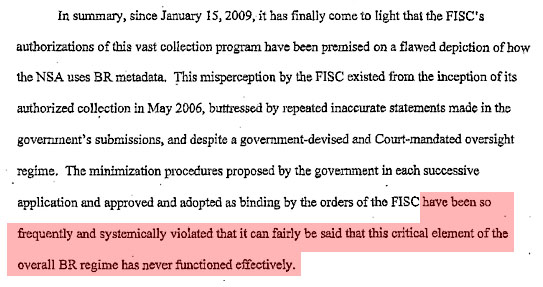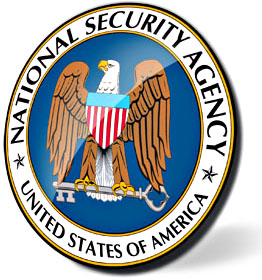
Gulnara Samoilova/ZUMA, Eric Draper/White House, <a href="http://www.darpa.mil/">US Department of Defense</>/DARPA
Recent news reports exposed how the National Security Agency has been collecting millions of Americans’ phone data and online communications. Here’s how we got from the terrorist attacks of 9/11 to the massive domestic spying operations of today:
| 2001 |
September 11: Nearly 3,000 people are killed when terrorists fly planes into the World Trade Center and the Pentagon, and crash another in Pennsylvania. Soon afterward, the NSA begins a “special collection program” to track the communications of Al Qaeda leaders and suspected terrorists. 
George W. Bush speaks at the NSA in 2002. NSA
October: Six weeks after 9/11, President Bush signs the USA Patriot Act, which lowers protections against government collection of Americans’ communications and personal records. |
| 2002 |
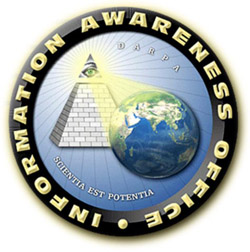
TIA logo WikiMedia Commons
February: The New York Times reveals that the Pentagon is “developing technologies to give federal officials instant access to vast new surveillance and information analysis systems” under a new agency called the Information Awareness Office, which later gave way to the Total Information Awareness program. |
| 2004 |
March: White House counsel Alberto Gonzales and Chief of Staff Andrew Card visit Attorney General John Ashcroft in the hospital seeking to persuade him to reauthorize the NSA’s domestic warrantless wiretapping program. The program will be revealed to the public a year and a half later by the New York Times. |
| 2006 |

NSA’s National Security Operations Center NSA
March: The Patriot Act is reauthorized. May: USA Today reports the NSA has been tracking millions of Americans’ phone calls with the help of major telecom companies. A few weeks later a former AT&T technician reveals that the company let the NSA tap into its fiber-optic lines in 2002, enabling it to monitor a majority of internet and phone traffic in the United States. |
| 2007 |
September: Microsoft becomes the first major internet firm to cooperate with the NSA’s PRISM program, giving the NSA the ability to collect data on search history, email, file transfers and live chats. Over the next few years, Yahoo, Google, Facebook, and other companies become part of the program, which won’t be revealed to the public until 2013. |
| 2008 |
July: Bush signs the FISA Amendments Act, which retroactively codifies the warrantless wiretapping program and compels telecoms and internet firms to give the government access to private communications if one party is “reasonably believed” to be outside the United States. It also gives telecoms retroactive immunity for handing over customers’ private data without a warrant. |
| 2009 |
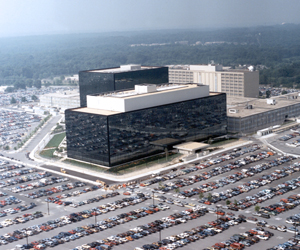
NSA headquarters NSA
January: Google begins giving data to the NSA under the PRISM program. June: A federal judge upholds immunity for telecoms that handed over private information. The same day, Facebook starts participating in the NSA’s PRISM program. |
| 2010 |
March 10: A federal judge rules that the NSA warrantless wiretapping program started during the Bush administration is illegal. The ruling, based on a 2006 lawsuit, will be overturned on a technicality in 2012. April 15: Federal authorities charge Thomas Drake, an NSA employee who passed information about the agency’s activities to reporters, under the Espionage Act. He accepts a plea deal on a lesser charge in 2011. |
| 2011 |
January: The NSA begins construction of a massive, 1 million square foot, $2 billion data center in Utah. “Just as we defend our lands, America also needs to also defend our cyberspace,” Sen. Orrin Hatch (R-Utah) says at the groundbreaking ceremony. It is scheduled to be completed in September 2013. May: The Patriot Act is renewed and signed by President Barack Obama. May: Sen. Ron Wyden (D-Ore.), who as a member of the Senate Intelligence Committee has access to classified materials, warns: “When the American people find out how their government has secretly interpreted the Patriot Act, they will be stunned and they will be angry.” |
| 2012 |
April-May 2012: As part of a leak investigation, the Department of Justice secretly obtained two months worth of phone records from multiple offices and individual reporters at the Associated Press. It’s top executive calls the DOJ’s actions a “massive and unprecedented intrusion into the newsgathering process.” June: The inspector general of the Office of the Director of National Intelligence says it “would itself violate the privacy of US persons” to reveal how many people the NSA had tracked inside the country. July: In a letter to Wyden, the Office of the Director of National Intelligence (DNI) acknowledges that some NSA activities have “circumvented the spirit of the law” and that on one occasion a FISA judge found that some of NSA’s activities violated the Fourth Amendment. December: Obama signs a five-year extension of the FISA Act. Amendments to provide more oversight of mass surveillance are defeated in the Senate. |
| 2013 |
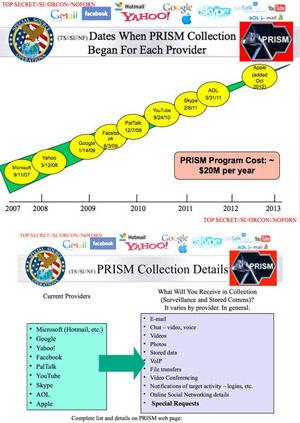
PRISM documents NSA/The Guardian
March: Wyden asks DNI chief James Clapper in a congressional hearing if the NSA collects information on millions of Americans. June: The Guardian reports that the NSA has been collecting millions of Verizon customers’ call data. A day later, the Guardian and the Washington Post reveal the existence of PRISM. Now under pressure from the revelations, Clapper admits that he lied in his congressional testimony. June: “Nobody is listening to your telephone calls. That’s not what this program’s about,” Obama says at a speech in Silicon Valley. “But by sifting through this so-called metadata, they may identify potential leads with respect to folks who might engage in terrorism.” He adds, “”You can’t have 100 percent security and then also have 100 percent privacy and zero inconvenience.” August 15: Based on more Snowden documents, the Post reports that the NSA had “broken privacy rules or overstepped its legal authority thousands of times each year” since 2008. Sens. Wyden and Mark Udall (D-Colo.) say the reported violations represent “just the tip of a larger iceberg.” August 29: The Post publishes details of the United States’ $52.6 billion intelligence “black budget,” more than $18 billion of which is dedicated to the CIA and NSA data collection and analysis operations. September 5: The New York Times, Guardian, and ProPublica report that the NSA has engineered ways to foil virtually all encryption protecting the average person’s “everyday communications in the Internet age.” September 9: Der Spiegel reports that the NSA has the capability to bypass security features of iPhones, Android devices, and BlackBerrys, allowing it to access contacts, location data, photos and perhaps credit card numbers and passwords. November 14: The New York Times reports that the CIA is covertly collecting bulk records of international financial transactions under the same laws that allow for the NSA’s bulk data collection, suggesting that the full scope of the US government’s bulk data collection efforts are unkown. |


